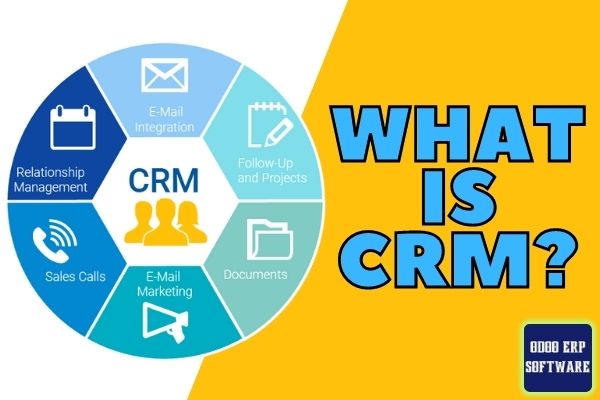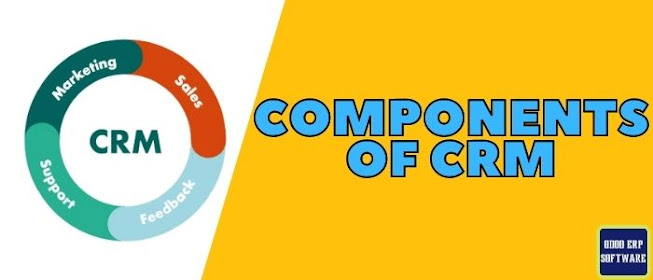Customer Relationship Management (CRM) is the fusion of implementation, procedure, and technologies that the organization uses to operate and analyze the customer interconnection and information throughout the lifecycle of the customer. The primary objective is to enhance the customer service relationship and accommodate customer loyalty and enhance the growth of sales. It assembles all the information of the customer throughout the different segments or the means of communication among the company and customer.
The software may be used with past, present, and potential customers. The conceptualization, process, and discipline that an organization must follow while communicating with the customers are termed CRM. The overall process makes direct contact with the customers like sales, service-related operations, forecasting, and the analysis of customer pattern and their behavior according to the companies view.
Components of CRM vary from the organization’s website and emails to massive numbers of emails and telephonic calls. A social network is a strategy that a company uses that benefits its bottom line.
Mostly the concept of CRM is used to make interactions with the external customers with every aspect during the customer lifecycle from discovery to education, purchase, and post-purchase.
CRM helps the smooth-running of the sales department, hard work of marketing departments, customer support service, accounting, etc.
Components of CRM
The CRM software integrates customer information and records into a centralized database so it will be convenient for the employees to access. There are the following components of the software:
1. Marketing Automation: The software with marketing automation capability may robotize the repeating task to enhance the marketing efforts at numerous stages of a customer lifecycle.
2. Salesforce Automation: It will be used to trace the customer interactions and automate some operations of the sales department that are necessary to build customer retention.
3. Geolocation Technology: Many CRM software includes the provision to support their customers according to their physical location. In addition to using this technology for contact management, it can also be used for forecasting sales based on the locations.
4. Human Resource Management: The CRM software ensures to maintain the employee’s information as contact details, performance reviews, etc. It also helps the HR department to manage their internal work.
5. Project Management: Some CRM software provides the functionality to trace the customer project detail like objectives, processes, risk management, and progress are all important aspects of strategic alignment.
Why Do Companies Require CRM?
The companies use CRM to accomplish their intention, but the overall objective is to enhance customer involvement and the company’s sales growth. Generally, this software fits the purchase and sales providers.
It will be a good practice to determine that the business would be benefit from the CRM is to consider an exception a CRM objective is to solve:
- Manage all the customer data in one integrated system. Rather than communicating with the different segments, we may use this software to generate a single up-to-date point of truth that may be accessible by anyone.
- With the help of the software, it will be easy to keep records of all the customer’s interactions.
- It helps to trace the growth of the sales department.
Benefits of CRM
The software supports the organization varying from small business to large size organization. There are the following benefits of CRM:
1. Customer Retention: The major benefit of CRM is to enhance the interaction with the customers. The software stores all the records of the customers across all the segments that involve demographics, purchase history, and prior interaction records.
2. Enhanced Sales: When customers retain the organization then automatically the sale of the organization keep on increasing. It also helps in forecasting sales records and maintaining them in a centralized place that may be accessed by anyone from the different segments.
3. Analytics: This is an essential part of CRM to understand customer behavior. The organization has a massive number of customers data, with the help of the software we can easily select which data is much more beneficial for the organization. This feature is built-in to the program.
4. Higher Productivity: With the help of the software, the employee can automatically handle the customer’s data and manage the customer interaction. The software has a monitoring system to examine the procedures and workflows and therefore helps in monitoring the organization’s production.
5. Enhanced Marketing: CRM enables you to design more specific marketing strategies that are tailored to your client’s requirements. It enables your company to take a more personalized relationship to communications, as well as build innovative products that your customers genuinely desire and need.
6. Improved Desirability: You may use a CRM to figure out which customers are profitable and which are not. This understanding allows you to deal with each part in the most cost-effective way possible. You will not only be able to cut your costs, but you will also be able to enhance profitability by focusing on your most profitable consumers.
When It Is Good To Adopt CRM?
Some startup or small organization keep their records either on their mailing system or maintain the spreadsheet. It will work for some time but it will break down as the organization wants to expand. Suppose the organization has several spreadsheets of customers data, some of the employees are updating customer data incidentally one or two spreadsheets are remained unchanged, which results in difficulties for the organization to trace the unchanged spreadsheet. It will disturb the whole database of the organization.
With such kind of a process, it will be not easy to maintain the customer records and interaction with the customers it would result in a decline in productivity which impacts the organization’s growth.
CRM is the best software to overcome such problems. It helps in maintaining the customer records which inturns in customer interaction. It will help in improving the productivity of the organization.
Conclusion
Customer Relationship Management allows a firm to match its strategy with its customers' demands to better address those goals and secure long-term customer loyalty. However, to achieve these goals, the various firm departments must collaborate and utilize measures in a coordinated manner. This is accomplished by employing CRM software to evaluate and update a customer database.







